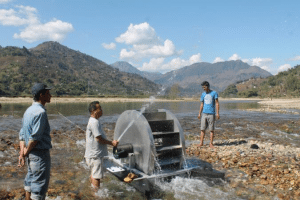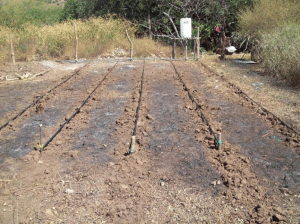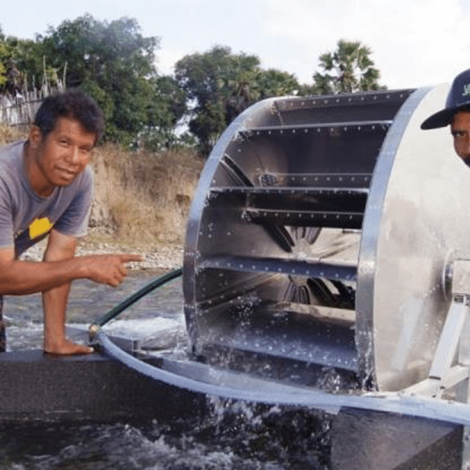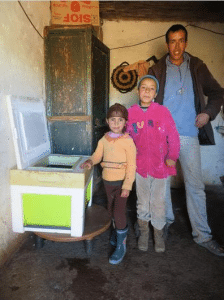Editor’s note: Engineering for Change and the empowering people. Network have been collaborating since 2014. Our partnership is anchored in the common goal of easing poverty through the appropriate use of technology to make the world a better place for everyone.
Hamid Oubir lives with his family in a small village in northern Morocco. To sell his produce in the market, he has to make his way to the nearest town early in the morning several times a week. If Hamid Oubir wants to prevent his fruits and vegetables from getting spoiled, he needs to make three-hour treks by foot to reach the market. Each time he leaves his field to go to the market he loses money, both in time spent and the cost of travel.
Simple technologies promote rural development
Many families in rural areas face the same challenges as Hamid Oubir. In developing regions, a quarter of the grains and more than half of the fruit and vegetable crops are damaged due to poor conditions for storage and processing. This is why comprehensive rural development and sustainable agricultural production play a key role in the fight against hunger. However, the lack of access to water and electricity, as well as the absence of facilities to store their produce, makes it hard for farmers like Hamid Oubir to reduce decayed produce and to provide adequately for themselves and their families.
Simple technological innovations can play a key role here. Startups by social entrepreneurs and university spin-offs are developing interesting solutions around the world. For example, small farmers could store their produce over the long term using simple refrigeration or silo solutions. With storage, the crops could sell more profitably at a later time, and the farmers could continue feeding their families even after the harvest period. This was the inspiration behind Spencer Taylor’s Evaptainer—an electricity free mobile refrigeration technology to keep food fresher, longer, that costs less than (USD) $30.
Hamid Oubir tried out these simply designed coolers. After using the Evaptainer for a short time he reported that he was able to save 4-5 percent extra each month. Not only did Evaptainer help keep his produce fresh for longer but also the time he was able to save had a positive impact on his life and productivity.
This example shows the impact that simple technologies can have on everyday life in developing regions and how hunger can be fought over the long term in small but sustainable steps. Thus, helping people to provide for themselves and to make the most of what they produce.
Use E4C’s Solutions Library to compare the Evaptainer and Barsha Pump to other similar technologies to choose the right fit for each context.
Politics, business and citizens need to develop together
Political support, economic participation, individual responsibility and educational opportunities are all required for the success and wider reach of such solutions. Measures such as the distribution of land ownership and the development of decentralized processes in agricultural production are a task for political leaders. However, individual steps to secure livelihoods in the agricultural value chain, including the establishment of sustainable trade relations, can often be achieved by people locally with little outside support. In addition, simple but effective technologies play an important role. They not only ease arduous manual work, improve the yield but often create a foundation for paid work and boost an individual’s economic prospects.

The Barsha Pump by aQysta uses the kinetic energy of the waterwheel to transport water to higher elevations along spiraling grooves without the need for active mechanical parts.
Networked know-how for greater efficiency
The Siemens Stiftung’s empowering people. Network pursues the aim of finding social entrepreneurs with promising, sustainable and low-tech solutions—like the Evaptainer—to connect them with peers, promote them sustainably and make them visible to potential partners. An essential aspect involves making the best possible use of local resources and supporting local small businesses in developing a promising corporate strategy. The transfer of knowledge and best practices, the actual application of technological innovations under local conditions, as well as the creation of worthwhile jobs and their maintenance is what motivates and drives the network members. All of this will ideally result in model projects that are locally adaptable offering people from diverse regions the chance to improve their living conditions.
The network database comprises some 100 tested solutions in nine different categories, from renewable energy to information technologies and education to recycling, water saving and health. Another focus is on agriculture, with many of the inventors and developers confronting the hunger problem in developing regions.

EOS International has produced a drip irrigation system that costs (USD) $20 uses local materials found in rural Nicaragua.
Simple technology to promote sustainable agriculture
The agricultural solutions within the network extend along the entire agricultural process chain—starting with irrigation technology, which can double the yield if not increase it five-fold. Here, for example, the Barsha Pump makes a valuable contribution. Using the 1.5m high waterwheel, it can pump up to 40,000 liters of water per day to higher elevations. The drip irrigation system from EOS is a low-cost alternative to expensive trickle irrigation. To reduce costs, EOS has replaced commercial components of the irrigation system with affordable everyday items. For (USD) $20 the system can irrigate 50m2 of farmland. This solution is already in use worldwide.
Half the world’s arable land is farmed by small-plot farmers. Their needs, challenges and working conditions are a key starting point for long-term positive changes. This is precisely where social enterprises using simple technologies make a difference every day, enabling farmers to work more efficiently, act more independently and improve the living conditions of their families and communities. Do you want to know more about the solutions and the innovators behind them? Please see our website and get in touch at empowering-people-network.
 Rolf Huber is Managing Director of the Board at Siemens Stiftung. Prior to joining Siemens Stiftung, Rolf Huber worked for Siemens AG since 1989. From 2009 to 2012, Rolf Huber resided in Johannesburg, South Africa, and was responsible for the company’s CSR programs as well as relations with governments on the African continent.
Rolf Huber is Managing Director of the Board at Siemens Stiftung. Prior to joining Siemens Stiftung, Rolf Huber worked for Siemens AG since 1989. From 2009 to 2012, Rolf Huber resided in Johannesburg, South Africa, and was responsible for the company’s CSR programs as well as relations with governments on the African continent.



Thanks about the data.